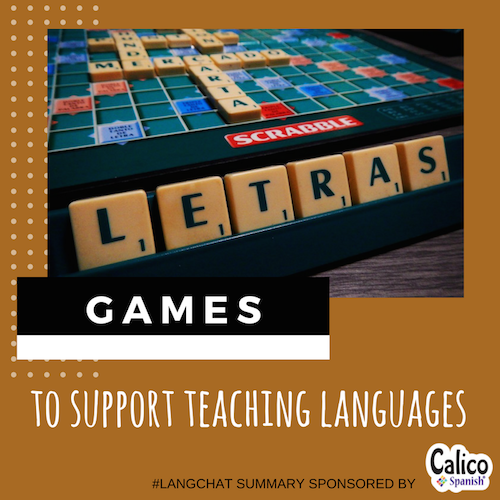Games to support teaching languages
Our #LangChat on “Games in the language classroom” was full of great ideas and discussion. I’ll try to summarize most of the ideas here. Pull up a chair and grab a cup of coffee, there are so many great ideas to share! Thanks to Diego Ojeda and Elvira Deyamport for moderating and for all the #LangChat participants for sharing their methods and successes.
Games can be a wonderful way to get students engaged in the language classroom. Some teachers shared that they prefer to use the term “activities” rather than “games” as it sells better with administrators. Regardless of what terminology you use, keep in mind @tmsaue1’s comment, “It’s not important WHAT game you play, but WHY you play the game. Does it allow students to use language?” Furthermore, as @ninatanti1 shared, “Engagement is the key. If they’re engaged, the activity/game is a success.”
 – Follow the blog on Bloglovin –
– Follow the blog on Bloglovin –
What makes a good game?
The answer to this question depends on your instructional goal. Generally, games are simply a fun and interactive way to use the target language. @tmsaue1 reminded us that finding ways to move past single word responses is very important. Others noted that they wanted to include culture in the games, and several people mentioned the that the competitive nature of games grabs students’ attention more than standard activities. Getting students moving to increase their retention of the language was also noted.
Game Ideas:
I must say that I impressed by the creativity and the amazing modifications made to games by our colleagues. This blog post is an attempt to organize the myriad of ideas so that you can enjoy the variety and opportunities presented in these games. Because this was a twitter chat, the descriptions of the games are limited. If you need clarity on a game, try asking for guidance on Twitter. The twitter id of each contributor is listed for easy reference. If you have a modification or detailed description of how to play, please share it in the comments. In some cases I have slightly modified tweets to make them easier to read. Full Archive: http://bit.ly/dLMisH
Diego Ojeda uses games extensively in his high school Spanish classroom and he has written a few documents to share many of his games with you. Visit his website to download your own copy. A few games are described in Spanish, but directions for most games are written in English.
Verbal games, word games, body games, group games, see examples: http://bit.ly/gFfNvs @DiegoOjeda66
You can also find additional non-tech games and activities described on the Language Teacher’s Collaborate wiki (founded by @DiegoOjeda66). http://bit.ly/dQtogC
Do you want more resources in a book format? Visit the Language Teacher’s Collaborate wiki for great resources for warm ups and games: http://bit.ly/gsd0BJ @diegoojeda66
@Fallinginflour mentioned that most website games are for romance languages, very few for Asian languages. SECottrell suggested folks follow @jannachiang as she is “the go-to for links for Asian languages.”
– Like Calico Spanish on Facebook –
Guessing games
- Show students a word and they have to speak [the target language] to get the other person to guess the word – but they cannot use that specific word. Students must use the words/phrases that know to communicate their thought (w/out saying that word). My students loved this! I wanted them to feel like they were dropped in country and couldn’t say word they wanted, so they had to talk around it, so to speak.@espanolsrs
- A modification to this game was recommended by @NinaTanti1:
I also use this with projected images on screen. One partner sees image and describes it to a partner who guesses.
Matching-Go Fish-Memory
- @SraSpanglish: is memory or go-fish w/ vocab too simple to be productive? ~~I don’t think so @k2quiere
- One activity/game I’ve just completed for Spanish 1 is a matching verb ‘magic square’; French 1 coming http://tinyurl.com/2cqkjgs @IslandLanguages
Speed Dating
- For international students: A ‘speed dating’ game where students must ask each other questions projected on PowerPoint screen. 30 seconds per slide. @ NinaTanti1
Web-based and digital games
- Quia.com Create your own quizzes or use games created by colleagues
- Vedoque.com (Online games for elementary students)@DiegoOjeda66
- TaskMagic: create your own quizzes and activities. @DiegoOjeda66
- IWB activities exchange.smarttech.com search spanish get templates flyswatter, koosh throw, race cars, etc @maestrachevre
- Learning games (Digital Dialects…)on my Foreign Language pg (just above Eiffel Tower)http://bit.ly/7mBkTo , I also have some game links on individual language pages on my site: http://bit.ly/27FSD @cybraryman1
- Many corporate websites have games on them – my students (of all ages) have enjoyed this a lot http://bit.ly/dYIpmB @SECottrell
- K-8 sts love this website with games http://cvc.cervantes.es/ensenanza/mimundo/default.htm @suarez712002
- E.g. Warner Bros. España has games with Looney Tunes, Scooby Doo, fun w/projector or IWB http://bit.ly/e1ZpCI @SECottrell
- Index of games at mundonick.com (Nick Jr) http://www.mundonick.com/juegos/index.jhtml @SECottrell
- Which team can give a movie star the best virtual makeover? http://www.marykay.com/whatsnew/virtualmakeover/default.aspx @SECottrell
- practice Spanish an reinforce what they learned in math class http://www.portalplanetasedna.com.ar/jugar_matematicas1.htm @suarez712002
Web 2.0 games (Scavenger hunt, photo hunts)
- Short descriptions in TL, studs find sites to meet the description & post URL on wiki pg for their group. Then they create own. @k2quiere
- Free Rice is online vocab game that can be played in different languages & for a good cause. Kids love it! @melindamlarson
- Internet scavenger hunts – Old blog post about this! Have students make them – our use my students’! http://bit.ly/g3DZLm @SECottrell
– Follow Calico Spanish on Twitter –
Sentence Building
- Did 1 w/pic as pieces of caterpillar kids use pics to build longest sentence possible great for team building and expanding thinking @maestrachevre
Jeopardy
- I’ve heard Jeopardy works well tho haven’t yet tried it. www.jeopardylabs.com awesome site!!! @NinaTanti1
- Jeopardy game for our shopping chapter http://j.mp/eWZQOR @maestrachevre
Truth and Lie
- Advanced students – 2 truths and a lie is fun to trigger “dudamos que…” + subjunctive @SECottrell
- RT @SraSpanglish: 2 truths&lie variation: 2 real instructions, 1 crazy was fun in cooking unit // brilliant @SECottrell
Baccalauréat (Scattegories)
- I play a scattegories-type game (Baccalauréat) each day for bellwork. Simply post a letter du jour and students race to finish first @melindamlarson
Family Feud
- Fun game is Family Feud – survey students in TL about their Favorites in categories, tabulate, then play game in TL @espanolsrs
Dice Games
- for youngers I use ‘math games’ with large dice, for olders substitute verb/subj.pron for dice numbers for ‘speed’ conjugations @islandlanguages
Charades
- In response to concerns that charades might not offer enough communication (word level only), @pamwesely suggested that she “would have audience create a meaningful sentence based on Charade word – keep kinesthetic learner engaged like @SraSpanglish says.” @pamwesely
I Never
- With high school, I do a clean version of the “I never” game to practice the present perfect. “Nunca he viajado a España,” [I have never visited Spain], etc. @senoritaraz
Simon Says and other Command [Imperative] Games
- @NinaTanti1 asked, “What about “Simon Says”” @melindamlarson replied, “great for reviewing body parts & imperatives.”
- With commands I break students up and have them create “chain of command.”Give these to other section to act out. Hilarious! @AlyssaMaske
- blindfold one students and other give directions-he has to find something hidden in classroom @suarez712002
- Treas hunt 4 commands.Student write directions in TL 2 spot in school & hides paper. Exchange directions when find paper get prize. @espanolsrs
Reader’s Theater
- Is not a game, but Reader’s Theater in the FL class is fun! @DiegoOjeda
- here’s a Reader’s Theater play in Spanish http://tinyurl.com/4ozvbze to review: no memorizing just reading might include reluctants @IslandLanguages
Who has the coin?
- A blog post I did for tonight’s – chat “Who has the coin?” fun for practicing descriptions http://bit.ly/ejlwjz @SECottrell
Cultural Games
Several people were looking for ideas to tie games to culture.
- Pasapalabra @DiegoOjeda66
- What’s in the bag: Describe and feel -what is it used for using authentic cultural items. @tonitheisen:
- With ID realia in a bag, you lose if you guess wrong or come up w/ dull description @SraSpanglish
- teach games through songs–authentic! @suarez712002
- RT @maestrachevre: @SraSpanglish @Elle_Spanish Skype and do role play too! You just blew my mind. Now where 2 find skype spkrs? @sraspanglish
- Song idea: give each student line from song. Write line on mini-dry erase board. Play song. When hear line, hold up your board. @espanolsrs
– Follow us on Instagram too! –
Who’s line is it anyway
- Who’s line is it anyway – props – for present progressive. Also great for creativity, quick thinking in language @DonaKimberly
- Discussion on activities that lead to spontaneity (Who’s line is it anyway) Some felt that the game fails as students aren’t comfortable being spontaneous, others felt that they need to overcome that through practice and repetition as they’ll face that in a target language country. One participant recommended writing sample sentences for 3 or 4 minutes to get started.
Word games:
- What games can encourage students to play WITH language? See http://bit.ly/gFfNvs @pamwesely
- 20 Questions is a good game to review interrogatives & require some critical thinking @melindamlarson
- Game w/a tough authentic text (online?): race to find specific words – scaffolds reading. Must be followed w/actual reading tho @pamweseley
- Just found this one http://bit.ly/fCV4of @ninatanti1
Learning Centers and Unit Studies
- A blog post on using learning centers with games and activities for a Weather Unit: http://bit.ly/gYw90n Learning Centers for weather unit @donakimberly
- food unit? supermarket dash kids get list and go to store website have to find all products fastest and w/certain amt $ @maestrachevre






One comment
[…] Calico Spanish http://blog.calicospanish.com/2011/02/11/games-to-support-teaching-languages.html […]